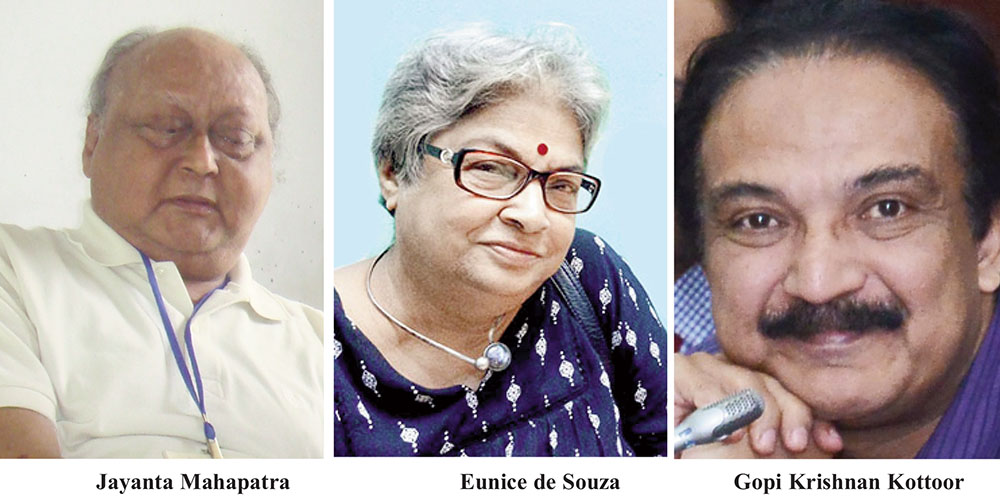
Internationally, poet Rabindranath Tagore (1861 – 1941) is celebrated as the greatest representative of Indian literature, and in 1913 was the first non-European to win the Nobel Prize for it. Indian poetry began to make its mark from then, and gradually became a force until the rise of such contemporary giants as novelist Salman Rushdie. Indian writers and critics (like Homi Bhabha and Gayatri Spivak) were central to the rise of post-colonial literature in the twentieth century.
In honour of Indian Republic Day, and in recognition of the force that Indian literature has become, producing some of the finest in the Commonwealth, we present a small sample of Indian poetry. Tagore is not represented, since he is so well known and has been dominant, but in a very small way, an idea is given of some of the vast store of that nation’s poetry past, recent and present.
Gopi Krishnan Kottoor, who is also a playwright and novelist, is among the most decorated and acclaimed contemporary Indian poets. He has won several awards and poetry prizes, including All India Special Poetry Prizes of the British Council – Poetry Society and the India All India Poetry Competitions between 1997 and 2017. Kottoor’s real name is Raghav G Nair and he has studied and held posts at universities in the USA and Germany.
Jayanta Mahapatra (1928 – 2023) represents the Indian establishment in modern poetry and has been one of the nation’s leading and most revered writers. He was also decorated with many awards and prizes and has lectured in Physics at colleges and universities. His 13 volumes of poetry include The False Start (1980). Critic Somnath Sarkar describes him as an “imagist” following the school of imagists led by Ezra Pound. The poem “Indian Summer”, among the most anthologised and most studied in India, is an example of imagist poetry.
Eunice de Souza is among the established Indian poets described by Victor Ramraj as “educated in the USA and Bombay, where she is a lecturer in English. She has written three volumes of poetry, including Ways of Belonging (1990), and children’s books”. This selection “Catholic Mother” is drenched in sarcasm and irony and makes a very interesting selection to represent contemporary Indian verse.
The untitled selection by Lal Ded (1320 -1392) is a reminder and example of ancient Indian verse.
Ever since the 14th century, Ded has been considered one of the region’s most revered mystic poets, even now, 700 years later. According to Melanie Kumar her work “has come down through the folk tradition and is considered as a foundation for Kashmiri literature. Her work holds value for both Hindus and Muslims.”
This brief excursion into some of the delights of Indian poetry is offered with an acknowledgement of the Indian contribution to Guyanese and West Indian poetry. The corpus of East Indian verse is a powerful force in Guyanese literature and this is a way of paying tribute to the Republic of India on its 75th Anniversary.
The Waters Of The Ganges
Have these waters of the Ganges
been flowing down the memory
for small change?
In these wet bones I see the winter
of a dead man’s eyes, he could have
sailed my blood.
Have these ghats burnt their dead in waste?
Ashes blow the air, fall in the eye
of the spread peacock feathers
searching first rain
as the boat drifts ashore,
A white flower floating on the water
is a translucence of God.
(Poet’s notes: Ghats are a broad flight of stone steps upon the riverbank of the Ganges in Varnasi. On some of the ghat shores, such as the Harischandra Ghat, the funeral fires always keep burning.)
Gopi Krishnan Kottoor
Africa
We used to sit
Around the red teak table
With the Book Of Knowledge
Open with its picture
Of Africa.
That’s where we were soon going.
To the country that stood out like the cat muscle
On Cassius Clay’s shoulders
We would get there,
As soon as father’s office papers
Came back from New Delhi.
For days, months, years,
Africa was our mulberry bush
Africa. In all weather, the book would lie open
Upon the teakwood table.
We would sit and dream of the crown of Pyramids
Or of our feet dipped in Uranium.
The pygmies came out of the Denkali forest
At night
With their poison-tipped arrows
But there was always Phantom,
With his skull ring
And we woke up without sweat.
Every morning we returned before breakfast to Africa
Turning brown among silver fish in the sunlight from
the window.
Decades later near a soccer field in America,
I saw Boko on film. I saw a black youth’s red blood
On the dark long white patrolled streets of Africa.
Now I know,
Africa is no open book
Gopi Krishnan Kottoor
Indian Summer
Over the soughing of the sombre wind,
priests chant louder than ever:
the mouth of India opens.
Crocodiles move into deeper waters.
Mornings of heated middens
smoke under the sun.
The good wife
lies in my bed
through the long afternoon;
dreaming still, unexhausted
by the deep roar of funeral pyres.
Jayanta Mahapatra
Catholic Mother
Francis X. D’Souza
father of the year
Here he is top left
the one smiling.
By the grace of God he says
we’ve had seven children
(in seven years)
We’re One Big Happy Family
God Always Provides
India will Suffer for
her Wicked Ways
(these Hindu buggers got no ethics)
Pillar of the Church
says the parish priest
Lovely Catholic Family
says Mother Superior
the pillar’s wife
says nothing.
Eunice de Souza
Untitled
I have seen an educated man starve,
a leaf blown off by bitter wind.
Once I saw a thoughtless fool
beat his cook.
Lalla has been waiting for the allure of the world
to fall away.
I might scatter the southern clouds,
drain the sea, or cure someone
hopelessly ill.
But to change the mind of a fool
is beyond me.
Lal Ded






